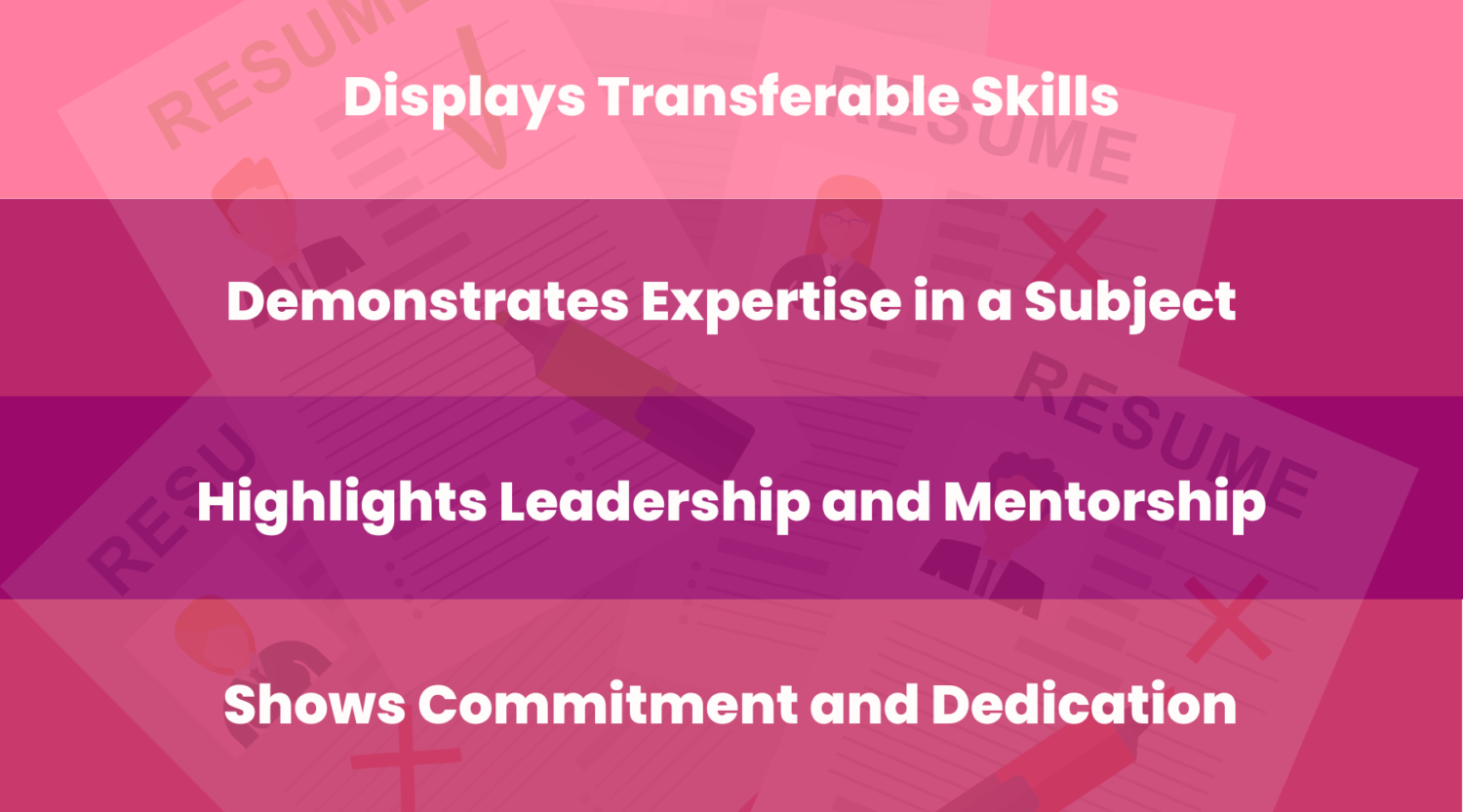Why You Need to Add Tutoring to Your Resume
“In order to be irreplaceable, one must always be different” (Coco Chanel).
Amidst today’s cutthroat job market, standing out from the crowd is no easy feat. How do you captivate interviewers and land your dream job? The secret lies in showcasing unique skills and experiences that go beyond the “basic” and “typical” repertoire.
But wait, here’s where things get exciting! Brace yourself for a revelation: tutoring. Yes, tutoring brings a plethora of benefits that can work wonders for your resume and turbocharge your career prospects.
In this article, we’ll explore why tutoring is not just a good job, but an absolute game-changer that you should definitely consider adding to your resume. We’ll also cover some tips for what to put on your resume and some examples!

Displays Transferable Skills
Tutoring is not just about helping others academically; it also provides an opportunity for personal growth and the development of valuable transferable skills. As a tutor, you enhance your communication skills by effectively conveying complex concepts to students of varying levels of understanding.
Hear that? That is the sound of a beautiful bullet point descriptor on your resume. But wait, it keeps getting better (This article is brimming with remarkable descriptors you can proudly add to your resume today).
You also develop patience, adaptability, and problem-solving abilities as you tailor your teaching methods to meet individual student needs. These skills are highly sought after by employers in various industries and can greatly enhance your employability.
Demonstrates Expertise in a Subject
By tutoring others, you not only showcase your expertise in the subject matter but also your incredible knack for sharing knowledge. It establishes you as a subject matter expert. Think about it. You reviewed the same material again and again and again. It is chiseled in your brain, so dazzle employers with your smarts and leave them clamoring for your expert status.
Whether it’s your geeky love for social sciences or math, there’s no shame in showcasing your passion. “Passion is just as, if not more, important as experience in a job interview,” says Kristen J. Zavo, author of Job Joy: Your Guide to Success, Happiness, and Meaning in Your Career. Your enthusiasm can be truly inspiring and help you stand out from other candidates even if the subject matter isn’t directly related to the job you’re pursuing (though that would certainly be an advantageous plus). ‘
Highlights Leadership and Mentorship Abilities
Tutoring opens the door for you to step into a leadership role and become a trusted mentor. And let’s face it, these opportunities can be rare gems, especially when you’re just starting out in your career.
When you guide and support students on their academic journey, it’s like being a real-life superhero—leading, inspiring, and making a difference in their lives. Talk about heartwarming stuff! And guess what? Employers absolutely adore those who can work their magic as mentors and motivate their team members.
Shows Commitment and Dedication
Tutoring requires commitment and dedication as you invest time and effort in helping others succeed academically. By including tutoring on your resume, you demonstrate your commitment to making a positive impact on the lives of others. Studies show a direct link between commitment levels and job performance. Employers appreciate candidates who exhibit dedication and a willingness to go the extra mile.

Tips for Highlighting Tutoring Experience on Your Resume
Did you know most resumes get no more than 10 seconds of attention from someone deciding whom to interview? That is not a whole lot of time. One needs to be concise and focus on outcomes. Here are a couple tips when adding tutoring to your resume:
- Showcase Student Success: Highlight how you helped students improve grades or understand challenging concepts.
- Emphasize Communication: Highlight your ability to explain concepts effectively and listen to students’ questions.
- Demonstrate Leadership: Mention any responsibilities like creating lesson plans.
- Include Relevant Skills: List skills such as communication, patience, problem-solving, and adaptability.
- Provide Specific Examples: Mention the subjects you tutored and any notable achievements.
Examples
Stutor
June 1880-June 1884
- Tutored 50+ college-level students in various Economics classes, resulting in a 100% class pass rate.
- Developed personalized study plans based on students’ learning styles and goals, helping them grasp complex concepts.
Stutor
December 2022-current
- Assisted 20+ students in developing effective study strategies and time management skills, resulting in improved organization and better academic outcomes.
- Received an average rating of 4.7 on 100+ sessions.
- Utilized strong communication skills to explain difficult concepts in a clear and concise manner.

Tutoring isn’t just your run-of-the-mill job; it’s a chance to grow, develop your skills, and make a real difference in people’s lives. When you include tutoring experience on your resume, you’re not just showing off your subject expertise, but also your leadership chops, unwavering commitment, and a whole lot of dedication. Plus, it’s like a secret sauce for boosting your communication and interpersonal skills, which employers go crazy for in any industry.
Embrace the perks of tutoring and set yourself up as the all-around superstar candidate in this wild, competitive job market!
Here are some other great resources for tips on writing resumes:





